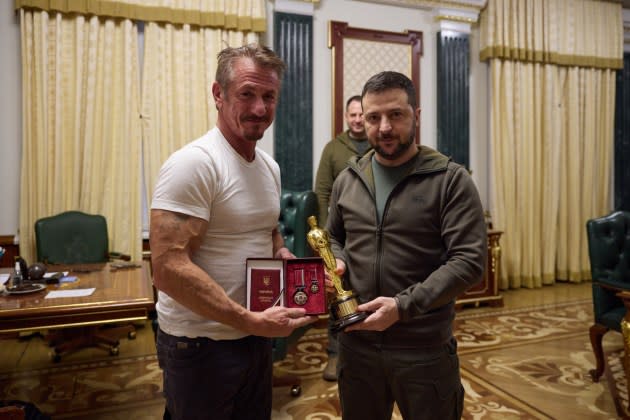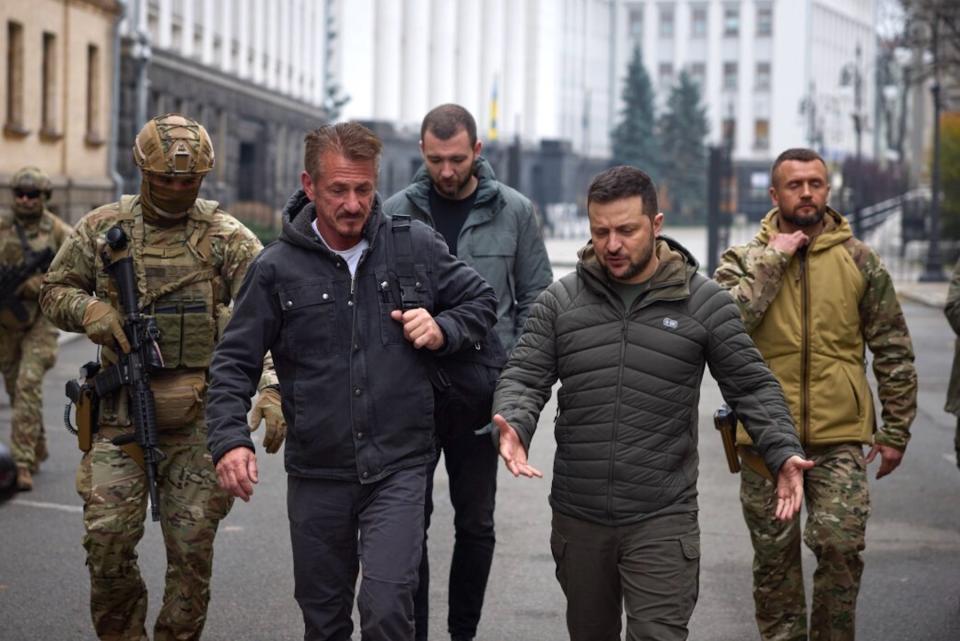‘Superpower’ Is Sean Penn’s Odd Vanity Project About Zelensky
- Oops!Something went wrong.Please try again later.

Sean Penn knows what you think of him.
Several minutes into the two-time Oscar winner’s new film, Superpower, ostensibly a documentary about the battle-hardened president of Ukraine, Penn’s gravelly voice answers a question posed in interviews past: Who do you think you are, Walter Cronkite? You have a savior complex?
More from Rolling Stone
'The Super Models' Directors Didn't Want to 'Make a Puff Piece'
Watch Kiefer Sutherland, Jason Clarke Star in 'The Caine Mutiny Court-Martial' Trailer
Frasier Is Back in Boston, Drinking Beer, and Being Snooty in New Revival Trailer
“I’ve been lucky enough to be able to travel,” Penn answers in a voiceover, “and, weathered though it is, my famous face gets me access to places and people I may otherwise not have known. And sometimes I feel I can be helpful.”
Thus the stage is set for a two-hour foray into Penn’s adventures in Ukraine, a country he says he visited seven times in the span of a year and a half. The original plan was to make a film about Volodymyr Zelensky, famously propelled to the presidency after campaigning as an outsider who vowed to “break the system” and its attendant corruption, mimicking the storyline of Servant of the People, the TV series that provided the former actor his most famous role. Then, in Feb. 2022, Russia began pounding Kyiv as it launched its full-scale invasion of Ukraine, starting the bloodiest war on European soil in decades. Penn was in the city at the time, about to hold his first meeting with the Ukrainian president. The film, which he and producer Billy Smith had envisioned as “cute” and “funny,” morphed with the circumstances, trying to tell the story of a country, and man, rising to meet the moment.
“This is a biased documentary,” Penn told an audience of around 80 people at a small screening in Tribeca last week. “If it’s propaganda, I’m proud.”
The film is propaganda, but that’s not the problem. The problem is it is bad propaganda.
There’s a real story for Penn to tell here, one he is perhaps uniquely positioned to deliver: how Zelensky, a political novice, used his decades in show business to muster the PR skills to win unprecedented Western support as his country sought to fight off a ruthless, nuclear-armed neighbor. Zelensky didn’t do this for acclaim, or ego, but because that support — in the form of weapons, sanctions, and aid — was, and remains, essential if his country is to push back Russia and survive.
This is not the story that Penn tells. Instead we get a mishmash of history — I counted six jumps back and forward in time as Penn and his co-director, Aaron Kaufman, attempt to spell out Ukraine’s post-Soviet history. We get interviews with Ukrainian officials and talking heads, journalists in the field, and former ambassadors back in DC. We get shots of Penn smoking, of Penn walking near a minefield, of Penn slumped on the floor of a train car, staring tortured into the distance. There is Penn wearing camouflage and a flak jacket, Penn in a nightclub, Penn rifling through a first aid kit, saying that the tourniquets are on top. There is Penn on the frontlines, we are never really told why. By the end of the film, Penn is speaking directly to the viewer in voiceover, as images flash on the screen. “You have a job as the head of state to lead, to inspire, to communicate, to sacrifice,” he says, as a drawing of George Washington and then Abraham Lincoln and finally a black-and-white photo of Zelensky float on the screen. Subtlety is not Penn’s strong point.
This is not a film about Zelensky; it’s a film about Penn’s feelings about Zelensky.
On the first full day of the invasion, Penn goes to see the Ukrainian president, but plans to ask him no questions. “Not on a day like this,” Penn says. “I hoped the film would be useful. That’s about it.” But as with so many things in this film — why is Penn in this minefield? — we are never really told what that means.
It’s a missed opportunity. A year and a half into this war, the overwhelming tide of support for Ukraine appears to be starting to crack, at least in this country, with Republican candidates jumping over themselves to see who can say more loudly that the billions being sent there deserve to be spent at home.
Maybe Penn’s film is just late. “The aura of the superhero has faded, as Zelensky himself predicted it eventually would,” Simon Shuster, author of a forthcoming biography of Zelensky, told me. “Penn’s film arose from that well-deserved moment of hero worship around Zelensky earlier in the invasion. But now the film seems out of key, because people have gotten more interested in the man behind the myth-making.”

It’s probably something deeper. There’s a part during one of Penn’s interviews with Zelensky. They’re sitting outside in a garden, it seems like springtime. Penn asks the president to recall their meeting the day of the invasion, the second time they had met. “I saw a change in you,” Penn tells him. “There was an air of — you were born for this moment.”
Penn wants us to love Zelensky because he does. There’s no play for emotion, or connection. He is aiming for pure transference. But who are these people who do what Sean Penn tells them? How big can that audience be?
In a way, it’s as if in that garden moment, Penn is not talking to Zelensky but to himself. Here he is with an actor who stepped outside of the norm and did something actors were not expected to do, and a huge part of the world loved him for it.
But we know Penn is not a reliable narrator. He deserves praise for being on the right side of history this time, but there’s so much to look back on and wince: the lionization of Venezuela’s Hugo Chavez, to say nothing of narco kingpin El Chapo. And it’s not like that’s all in the past. At a Q&A following the screening in Tribeca, Penn appeared shaky, if impassioned. At one point, he went on a rant about great leaders. “We take great leaders down for nothing,” he said, growing fidgety in his seat, decrying “trends” that had led so many men to lose their positions of power. “I think there’s a great leader in the room right now,” Penn continued, before pointing into the darkness and toward the third row. There sat Andrew Cuomo, who resigned as governor of New York in 2021 following multiple allegations of sexual misconduct.
There are some incredible films to watch about Ukraine — particularly 20 Days in Mariupol, directed by Pulitzer Prize-winning AP journalist Mystyslav Chernov and winner of the Audience Award at Sundance. You will feel the pain being inflicted on Ukraine right now — rather than watch Sean Penn’s feelings about it.
Best of Rolling Stone

